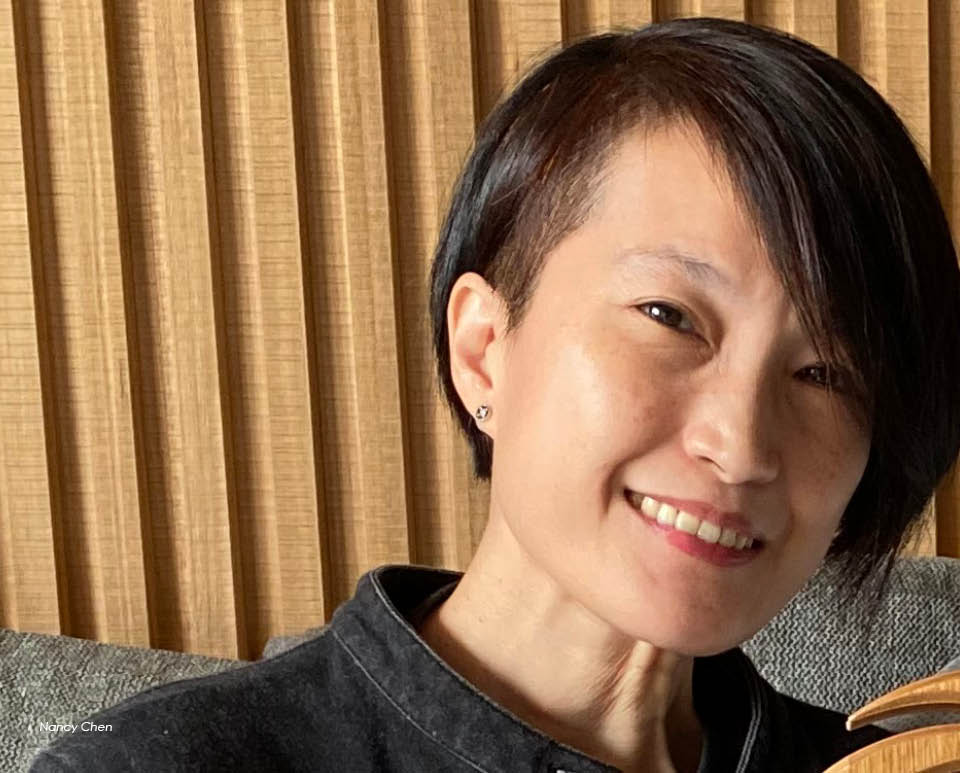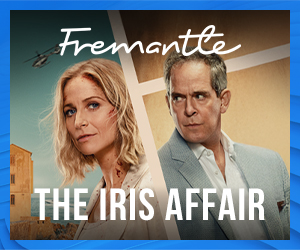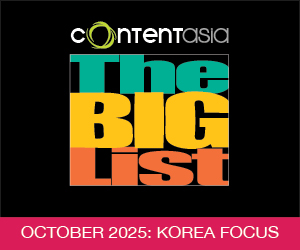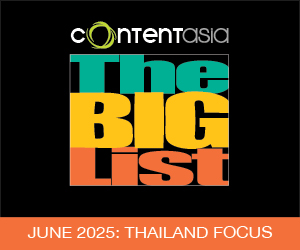
Taiwanese family series, Papa & Daddy, is part of the next generation of LGBTQ-themed stories, with, among other characters and story lines, grown-up characters, kids, ex-wives, blended families, career conflicts, elderly parents... Zhu Zijiao talks to writer/director Nancy Chen about the multi-season show for streaming platform GagaOOlala, what she was trying to achieve and what she would like the series to stand for.
What do you think the significance of Papa & Daddy is for Asia’s LGBTQ community?
“Taiwan is at the forefront of protecting LGBTQ rights in Asia. I aim to take advantage of our conditions and resources to tell the story of a real gay family, so that other countries and regions in Asia can see the hope: is it possible for them to do the same thing one day? For I believe that everyone has the right to start a family with their beloved ones.
“In fact, I won’t intentionally glorify Taiwan’s achievements in the LGBTQ activities and welfare, as marriage is not an absolute ‘happy ending’. In other words, there is a lot more to the nature of marriage. Whether homosexual or heterosexual, there are many hurdles to overcome in the coursework of marriage.
“In Papa & Daddy, honestly, it shows you what kind of problems a family with two dads will encounter. For example, they have to deal with the scrutiny from the external community, the push and pull from internal family, and the parenting strife and distress – even though their love for their children is the same. These problems are also encountered by other families; there is nothing special about gay families.
“Of course, in the end, I still wish that we all have a happy ending, so that we can see that we have the positive energy to embrace hopefulness. I would like to show our non-LGBTQ friends, and even the whole society, that LGBTQ is just a label, and that no matter what kind of situation men and women encounter in their respective families, the most important thing is to resolve it with love.”
You’ve worked on a few titles related to LGBTQ issues, including 5 Lessons in Happiness – Throuple and History 4 – Close to You. Have your perceptions changed? Are these themes you will continue to work on?
“Perhaps it’s because of a special fate, or perhaps because people recognise my ability to handle this kind of story, that I’ve been appro...
Taiwanese family series, Papa & Daddy, is part of the next generation of LGBTQ-themed stories, with, among other characters and story lines, grown-up characters, kids, ex-wives, blended families, career conflicts, elderly parents... Zhu Zijiao talks to writer/director Nancy Chen about the multi-season show for streaming platform GagaOOlala, what she was trying to achieve and what she would like the series to stand for.
What do you think the significance of Papa & Daddy is for Asia’s LGBTQ community?
“Taiwan is at the forefront of protecting LGBTQ rights in Asia. I aim to take advantage of our conditions and resources to tell the story of a real gay family, so that other countries and regions in Asia can see the hope: is it possible for them to do the same thing one day? For I believe that everyone has the right to start a family with their beloved ones.
“In fact, I won’t intentionally glorify Taiwan’s achievements in the LGBTQ activities and welfare, as marriage is not an absolute ‘happy ending’. In other words, there is a lot more to the nature of marriage. Whether homosexual or heterosexual, there are many hurdles to overcome in the coursework of marriage.
“In Papa & Daddy, honestly, it shows you what kind of problems a family with two dads will encounter. For example, they have to deal with the scrutiny from the external community, the push and pull from internal family, and the parenting strife and distress – even though their love for their children is the same. These problems are also encountered by other families; there is nothing special about gay families.
“Of course, in the end, I still wish that we all have a happy ending, so that we can see that we have the positive energy to embrace hopefulness. I would like to show our non-LGBTQ friends, and even the whole society, that LGBTQ is just a label, and that no matter what kind of situation men and women encounter in their respective families, the most important thing is to resolve it with love.”
You’ve worked on a few titles related to LGBTQ issues, including 5 Lessons in Happiness – Throuple and History 4 – Close to You. Have your perceptions changed? Are these themes you will continue to work on?
“Perhaps it’s because of a special fate, or perhaps because people recognise my ability to handle this kind of story, that I’ve been approached to direct many gay and lesbian productions over the past two years. I am not a stranger to this community myself, as I have many gay friends around me and I have always been very supportive of them, and I am honoured to be able to use these opportunities to speak out on their behalf. I hope that I can break down the prejudices and stereotypes that the public has about them and present their stories in a more objective way. I’m definitely not averse to continuing to approach similar subjects, but I don’t want to be labeled either. As a filmmaker myself, I have many other types of stories in mind that I would like to tell. I feel that if the story is interesting enough and shares the same values and core spirit that I retain, I won’t reject it.”
Papa & Daddy returned to GagaOOlala for a second season recently. What new elements did you bring to the sequel? “We left a hook at the end of the previous season – Damian and his ex-wife’s child, Jimmy, joined the family, and this part has quite a lot of stories worth stretching out, such as how [Damian’s partner] Jerry must deal with and accept the fact that his other half actually has another child.
“Both gay and straight families may face the puzzle of reunification. Maybe each of you had kids in your last relationship and then brought them into your current family. How Jimmy, the ‘new son’, affects Damian and Jerry is one of the second season’s highlights.
“Jerry not only has to deal with the relationship with his new son, but also has to confront Damian’s ex-wife. At the same time, there’s a new handsome waiter, Wei, played by Tau, in Damian’s restaurant. He seems to have some ambiguous feelings for Damian… But that doesn’t mean the pressure is entirely on Jerry’s side and Damian can rest easy because this season Jerry’s schoolboy crush, Gao (played by Peter Kuan), also appears. He is an outlet for many unspoken complicated emotions of Jerry, but also brings Damian a full sense of crisis.
“Another focus of the second season is how Jerry handles the new push from his parents. Kai, a child born to Damian and a surrogate in the U.S., is not directly related to Jerry. This season, we explore more of this part of the story, as Jerry has successfully come out, but his parents are hoping that Jerry will have his own biological child.
“At the same time, the story of Amy and Shasha, the lesbian mothers in season one, is further developed. They also have a son. The story of this child is related to the issue of gender identity. My inspiration for this story line came from the ‘Rose Boy’ Yeh Yung-chih incident. It carries a lot of significance in my mind.”
What were your challenges in directing the second season?
“Both the story capacity and the scale of filming are much larger in the second season than the first season, and each episode is longer. The first season has six episodes. We extended it to eight in Papa & Daddy 2. A lot of new characters have come on board, and they help make the story more rounded.
“The challenge that comes with this is the increased difficulty of filming. In the first season, there was footage of the 2020 Taiwan Gay Pride Parade. I think it’s meaningful to map a real social event into the story. In the second season, I wanted to include similar commemorative events to convey tenderness and positive power to everyone. It was a challenge for me to complete these big scenes in a limited time.
“I am still the scriptwriter of this season... like the initial season, the most difficult part is to work with children. Because Kai is around four or five years old, and the kid who plays him is not a professional actor. Therefore, there are still a lot of uncontrollable factors on set.
“In the early stages of shooting, I asked [lead actors] Muhan and Melvin to try to bond with him. During the shooting, I attempted to get him to understand the situation that he had to act out. By the second season, I feel I was a little more experienced in directing young actors. Even though overall it is still difficult. I would also like to thank other actors who helped on set. For example, Yujia who plays Kai’s elder brother Jimmy; he helped me a lot on set.”
Was it easier to direct Jimmy’s performance? He seems to be about the same age as your own child. “It was much easier. Yujia is a good dancer. Although he hasn’t had that much experience in acting, he feels comfortable expressing himself in front of the camera. I tailored the role of Jimmy for him. Jimmy is also a cool young man who loves hip hop. Apart from this, Yujia is actually a native Taiwanese kid, but to play the role of America-born Chinese, he practiced speaking English beforehand to reach the level of native speaker. I think he got the hang of this part quite well.”
Huihuang Lin, who plays Damian’s partner Jerry in season one, dropped out of Papa & Daddy 2 due to a scheduling clash, and Muhan Chiu replaced him. How did you manage this?
“Huihuang’s absence is no doubt a pain in my heart. When our team found out this bad news, we did a lot of hard work to get him back. However, there was literally no way out, as his schedule really didn’t fit. Considering the time planning of other actors, it was impossible for us to hold our shooting indefinitely.
“Later on, we even thought about removing the character of Jerry from Papa & Daddy 2. But after thorough discussion, I made up my mind that I still want to tell the story of Jerry and Damian. Thus we had to bear the tough decision to change the cast, to find a new Jerry.
“I didn’t ask Muhan to replicate or imitate Huihuang’s performance in Papa & Daddy 1 because they are different actors and it would be unfair to Muhan to do so. From my point of view, Muhan’s handling Jerry is not the same as Huihung’s, but I think both are rather appropriate.
“By Papa & Daddy 2, Jerry has grown up. He is more mature and therefore needs to show more inner emotions and sentiments. Muhan is slightly older than Huihuang, which is perfect for this change in character. Melvin also felt the development of Jerry’s character arc when he was acting with Muhan. I think Muhan has reached and achieved the effect I wanted. I am very satisfied.”
Jozie Lu not only continues acting in the show, but also sings the theme song, The Road, and writes the lyrics herself. How was the song produced? “When I invited Jozie to make a theme song for Papa & Daddy 2, she said yes immediately. And she said that she had even been thinking about asking me before if she would have the opportunity to sing the theme song this time, and she didn’t expect me to come and ask first (laughs).
As I mentioned before, one of our episodes is based on the story of ‘Rose Boy’ Yeh Yung-chih. Jozie happens to play Amy, a mother who accompanies her child through the turmoil of gender identity. I said to Jozie that I wanted the song to be based on this story and her character as well. She was very thoughtful and after doing a lot of research, she wrote the lyrics from the perspective of a parent whose kid is a sexual minority, in their mood and voice.”
Which film directors have most influenced your work?
“My junior days coincided with the new wave of Taiwanese cinema, and I was greatly influenced by Yang Te-chang and Tsai Ming-liang. I worked with Tsai as his assistant director. Both Tsai and Yang would bring a critical eye and sharply confront the problems in modern society. That’s why I particularly love the realistic parts of their films.
“At the same time, I am also of the generation that grew up watching Hong Kong films. At that time, Hong Kong films had a very prosperous market, and they had a great variety of genre elements. Whether it was police films, comedies, zombies or other genres, they were all very well-developed. This also influenced me in a subtle way. For example, I would like to be on the comedic side. I hope that apart from the story I want to tell, my work can also echo with the audience and provide them with an outlet for entertainment, as well as an outlet for emotions.”
A version of this feature appeared in ContentAsia December 2022




























